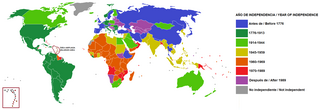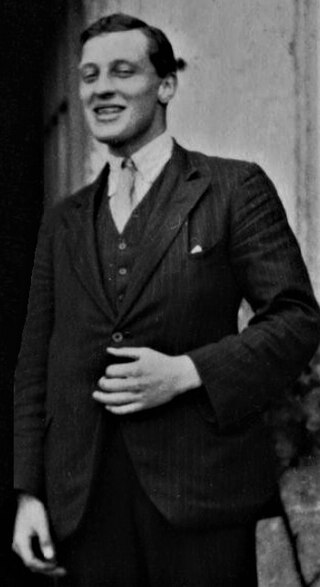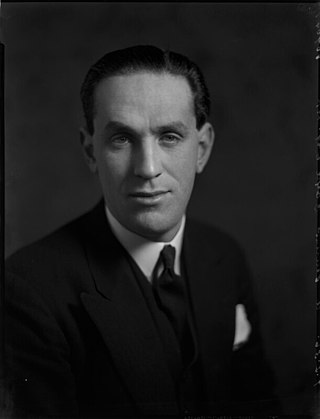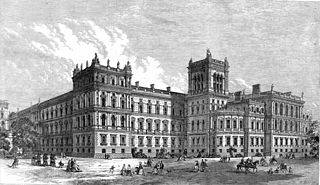Related Research Articles

The British Empire comprised the dominions, colonies, protectorates, mandates, and other territories ruled or administered by the United Kingdom and its predecessor states. It began with the overseas possessions and trading posts established by England in the late 16th and early 17th centuries. At its height in the 19th and early 20th centuries, it was the largest empire in history and, for a century, was the foremost global power. By 1913, the British Empire held sway over 412 million people, 23 percent of the world population at the time, and by 1920, it covered 35.5 million km2 (13.7 million sq mi), 24 per cent of the Earth's total land area. As a result, its constitutional, legal, linguistic, and cultural legacy is widespread. At the peak of its power, it was described as "the empire on which the sun never sets", as the sun was always shining on at least one of its territories.

The Mau Mau rebellion (1952–1960), also known as the Mau Mau uprising, Mau Mau revolt, or Kenya Emergency, was a war in the British Kenya Colony (1920–1963) between the Kenya Land and Freedom Army (KLFA), also known as the Mau Mau, and the British authorities. Dominated by Kikuyu, Meru and Embu fighters, the KLFA also comprised units of Kamba and Maasai who fought against the European colonists in Kenya - the British Army, and the local Kenya Regiment.

The Malayan Emergency, also known as the Anti–British National Liberation War, (1948–1960) was a guerrilla war fought in Malaya between communist pro-independence fighters of the Malayan National Liberation Army (MNLA) and the military forces of the Federation of Malaya and Commonwealth. The communists fought to win independence for Malaya from the British Empire and to establish a communist state, while the Malayan Federation and Commonwealth forces fought to combat communism and protect British economic and colonial interests. The term "Emergency" was used by the British to characterise the conflict in order to avoid referring to it as a war, because London-based insurers would not pay out in instances of civil wars.

Decolonization is the undoing of colonialism, the latter being the process whereby imperial nations establish and dominate foreign territories, often overseas. The meanings and applications of the term are disputed. Some scholars of decolonization focus especially on independence movements in the colonies and the collapse of global colonial empires.

Evelyn Baring, 1st Baron Howick of Glendale,, was Governor of Southern Rhodesia from 1942 to 1944, High Commissioner for Southern Africa from 1944 to 1951, and Governor of Kenya from 1952 to 1959. Baring played an integral role in the suppression of the Mau Mau rebellion. Together with Colonial Secretary Alan Lennox-Boyd, Baring played a significant role in the government's efforts to deal with the rebellion, and see Kenya through to independence. Baring was aware of abuses against Mau Mau detainees. He was elevated to being the 1st Baron Howick of Glendale in 1960.

The Gaspee affair was a significant event in the lead-up to the American Revolution. HMS Gaspee was a Royal Navy revenue schooner that enforced the Navigation Acts around Newport, Rhode Island, in 1772. It ran aground in shallow water while chasing the packet boat Hannah on June 9 off Warwick, Rhode Island. A group of men led by Abraham Whipple and John Brown I attacked, boarded, and burned the Gaspee to the waterline.

The territorial evolution of the British Empire is considered to have begun with the foundation of the English colonial empire in the late 16th century. Since then, many territories around the world have been under the control of the United Kingdom or its predecessor states. When the Kingdom of Great Britain was formed in 1707 by the union of the Kingdoms of Scotland and England, the latter country's colonial possessions passed to the new state. Similarly, when Great Britain was united with the Kingdom of Ireland in 1801 to form the United Kingdom, control over its colonial possessions passed to the latter state. Collectively, these territories are referred to as the British Empire. When much of Ireland gained independence in 1922 as the Irish Free State, the other territories of the empire remained under the control of the United Kingdom.

The decolonisation of Africa was a series of political developments in Africa that spanned from the mid-1950s to 1975, during the Cold War. Colonial governments gave way to sovereign states in a process often marred by violence, political turmoil, widespread unrest, and organised revolts. Major events in the decolonisation of Africa included the Mau Mau rebellion, the Algerian War, the Congo Crisis, the Angolan War of Independence, the Zanzibar Revolution, and the events leading to the Nigerian Civil War.

Alan Tindal Lennox-Boyd, 1st Viscount Boyd of Merton, CH, PC, DL, was a British Conservative politician.
The 1959 Hola massacre was a massacre committed by British colonial forces during the Mau Mau Uprising at a colonial detention camp in Hola, Kenya.

The Information Research Department (IRD) was a secret Cold War propaganda department of the British Foreign Office, created to publish anti-communist propaganda, including black propaganda, provide support and information to anti-communist politicians, academics, and writers, and to use weaponised information, but also disinformation and "fake news", to attack not only its original targets but also certain socialists and anti-colonial movements. Soon after its creation, the IRD broke away from focusing solely on Soviet matters and began to publish pro-colonial propaganda intended to suppress pro-independence revolutions in Asia, Africa, Ireland, and the Middle East. The IRD was heavily involved in the publishing of books, newspapers, leaflets and journals, and even created publishing houses to act as propaganda fronts, such as Ampersand Limited. Operating for 29 years, the IRD is known as the longest-running covert government propaganda department in British history, the largest branch of the Foreign Office, and the first major anglophone propaganda offensive against the USSR since the end of World War II. By the 1970s, the IRD was performing military intelligence tasks for the British Military in Northern Ireland during The Troubles.
Caroline Elkins is Professor of History and African and African American Studies at Harvard University, the Thomas Henry Carroll/Ford Foundation Professor of Business Administration at Harvard Business School, Affiliated Professor at Harvard Law School, and the Founding Oppenheimer Faculty Director of Harvard's Center for African Studies.

Imperial Reckoning: The Untold Story of Britain's Gulag in Kenya, published in the UK as Britain's Gulag: The Brutal End of Empire in Kenya, is a 2005 nonfiction book written by Caroline Elkins and published by Henry Holt. It won the 2006 Pulitzer Prize for General Nonfiction.

The Colonial Office was a government department of the Kingdom of Great Britain and later of the United Kingdom, first created in 1768 from the Southern Department to deal with colonial affairs in North America, until merged into the new Home Office in 1782. In 1801, colonial affairs were transferred to the War Office in the lead up to the Napoleonic Wars, which became the War and Colonial Office to oversee and protect the colonies of the British Empire. The Colonial Office was re-created as a separate department 1854, under the colonial secretary. It was finally merged into the Commonwealth Office in 1966.

The Colony and Protectorate of Kenya, commonly known as British Kenya or British East Africa, was part of the British Empire in Africa from 1920 until 1963. It was established when the former East Africa Protectorate was transformed into a British Crown colony in 1920. Technically, the "Colony of Kenya" referred to the interior lands, while a 16 km (10 mi) coastal strip, nominally on lease from the Sultan of Zanzibar, was the "Protectorate of Kenya", but the two were controlled as a single administrative unit. The colony came to an end in 1963 when a native Kenyan majority government was elected for the first time and eventually declared independence.

Hanslope Park is located about half a mile south-east of the village of Hanslope in the City of Milton Keynes, Buckinghamshire, England. Once the manorial estate of the village, it is now owned by the UK Foreign, Commonwealth and Development Office (FCDO), and is also home to His Majesty's Government Communications Centre ('HMGCC') and FCDO Services.

The "Wind of Change" speech was an address made by British Prime Minister Harold Macmillan to the Parliament of South Africa on 3 February 1960 in Cape Town. He had spent a month in Africa in visiting a number of British colonies. When the Labour Party was in government from 1945 to 1951, it had started a process of decolonisation, but the policy had been halted or at least slowed down by the Conservative governments since 1951. Macmillan's speech signalled that the Conservative Party, which formed the British government, would no longer impede independence for many of those territories.
The Foreign and Commonwealth Office Migrated Archives are a collection of about 20,000 files and other records created by the governments of 37 British colonial dependencies, removed to the UK at independence, and held clandestinely for decades in various repositories in and around London. They came only from territories administered by the Colonial Office, so not from India and other dependencies administered by the India Office and its predecessors, whose records are in the India Office Records at the British Library.
The Kenya Land and Freedom Army (KLFA), also known as the Mau Mau, was a Kenyan insurgent group which fought against British colonial rule in Kenya during the Mau Mau rebellion from 1952 to 1960. Its membership consisted largely of the Kikuyu people. The KLFA was led by Dedan Kimathi for most of its existence. After four years, British forces managed to destroy the KFLA militarily, and Kimathi was captured and executed in 1957. Though the Mau Mau rebellion was ultimately suppressed, it played a major role in achieving Kenya's independence, which occurred in 1963.
Legacy of Violence: A History of the British Empire is a 2022 nonfiction history book by American historian and professor Caroline Elkins. The book covers the history of the British Empire from the Great Bengal famine of 1770 through the post-World War II period of recurring end-of-empire insurgencies up until the present-day, including the Mau Mau High Court case and the ongoing imperial history wars. The book was short-listed for the 2022 Baillie Gifford Prize for Non-Fiction.
References
- ↑ Gilbert, Rosa (3 November 2016). "Erasing Empire". Jacobin.
- ↑ Cobain, Ian (2016). The history thieves: secrets, lies and the shaping of a modern nation. London: Portobello Books Ltd. ISBN 978-1-84627-584-5.
- ↑ Elkins, Caroline (2022). Legacy of Violence: A History of the British Empire. Knopf Doubleday. p. 618. ISBN 978-0-593-32008-2.
- 1 2 Bowman, Craig (9 January 2014). "Operation Legacy: How Britain Destroyed Thousands Of Colonial Files". War History Online. Retrieved 26 July 2017.
- 1 2 3 4 Milmo, Cahal (29 November 2013). "Revealed: How British Empire's dirty secrets went up in smoke in the colonies" . The Independent. Archived from the original on 24 May 2022. Retrieved 12 March 2022.
- ↑ Cobain, Ian; Bowcott, Owen; Norton-Taylor, Richard (17 April 2012). "Britain destroyed records of colonial crimes". The Guardian.
- ↑ Moon, Penderel, ed. (1973). "The Interim Government (July-October 1946): September 5". Wavell: The Viceroy's Journal (PDF). London: Oxford University Press. pp. 346–347.
- ↑ Rostron, Bryan (28 June 2020). "OP-ED: The horror! The horror! The long colonial hangover". Daily Maverick . Retrieved 18 January 2021.
- ↑ Sato, Shohei (11 April 2017). "'Operation Legacy': Britain's Destruction and Concealment of Colonial Records Worldwide". The Journal of Imperial and Commonwealth History. 45 (4): 697–719. doi: 10.1080/03086534.2017.1294256 . ISSN 0308-6534.